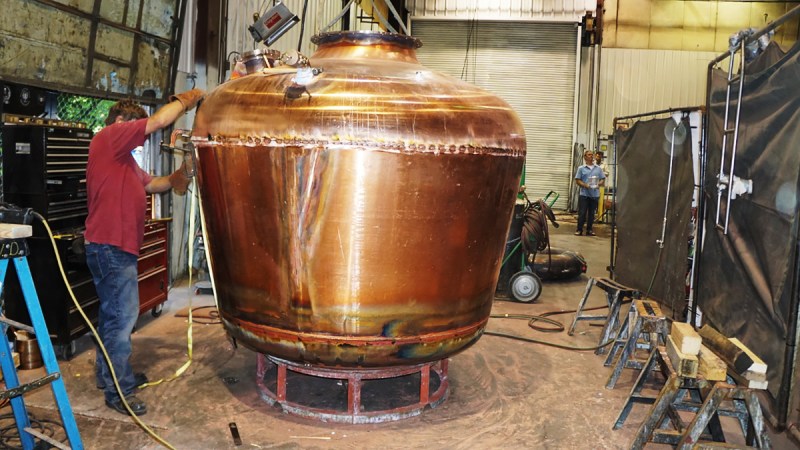
At 3:30, the bell signals a hard day’s work is finished and the denim and leather clad workers line up to punch their time cards before heading off for the night.
Aside from a digital clock on the wall in the workshop, there’s no indication these craftsman are working in 2017 as the products they work on have been a crucial piece to the distilling industry in Kentucky for more than a century. Today, Vendome’s stills can be found in distilleries across the globe, including major bourbon distillers like Buffalo Trace, Jim Beam and Wild Turkey.
Vendome is housed in a mishmash of buildings on Franklin Street in Louisville, with the offices in an old 1830s row house, hinting at its age. Although the Vendome origin story stretches back into the 19th century, the company made its incorporation formal on April 1, 1912.

The company was founded by Elmore Sherman Sr. and the company is still in the family, run today by its fourth generation, Tom and Mike Sherman. Elmore Sherman Sr.’s experience with copper spanned back to 1901 when he worked for the Louisville branch of Cincinnati-based Hoffman, Ahlers & Co., and before long he was head of the branch, before starting his own operation.
Early customers included some in Kentucky, like J.T.S. Brown & Sons and E.H. Taylor Jr. & Sons, but also in Mexico, Panama and Burma. Stills weren’t made simply for spirit distillation either, nor are they today, as the fabricator began supply companies making products like creosote and turpentine.
The company also services brewing, dairy and food and confectionary industries. Vendome saw its distillery business halt as Prohibition was enacted in 1918, by founder Elmore Sherman Sr. kept the operation alive.
Eventually, with consolidation of distilleries, Vendome became one of the main suppliers for the distilling industry.
“There were many distilleries before and after Prohibition and most of them were small,” said Tom Sherman, Vendome’s President. “Through consolidation starting after WWII they became the large distilleries and some companies like Vendome continued as their main equipment providers while others either ventured into other endeavors or went out of business.”

The company boomed in the 1930s with the repeal of Prohibition and adapted with the demand of industrial alcohol during World War II. The company has made countless shifts throughout its history, including during the mid-20th century as other spirits came into popularity and bourbon declined.
Once doing business mainly in Kentucky, by the 1970s, Vendome was shipping 90 percent of its products out of state. Vendome’s stills have gone all over the Americas, New Zealand, Australia, Europe and Asia.
The shift continues today with the rise of small distilleries across the globe and Vendome continues to grow its offerings to producers in Kentucky and elsewhere. Sherman said the craft distillery market is incredibly important to the fabricator as new business floods in.
As the company continues to grow and send its stills across the globe, it’s important the still manufacturer stays true to its roots. As stills vary in size, so too does the price and the time it takes to complete them. But each still is artfully built by Vendome’s many employees.
“We are who we are,” Sherman said. “We stand behind everything that goes out of here. It’s hard to argue with over 100 years of success.”


